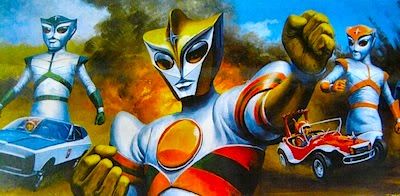When the original case was tried in Thailand, Chiayo won a lot of their demands, but when the case was appealed in Tokyo Superior Court, many of Chiayo's claims were dismissed. Here is what Chiayo was claiming (IIRC), which I am paraphrasing from the original news story of the outcome of the decision of the Tokyo Superior Court:
1. Complete global intellectual property ownership of Ultraman: DENIED. Tsuburaya was deemed the owner of the intellectual property.
2. Acknowledgment and Title of "Creators" of Ultraman (based on the Thai Buddha argument): DENIED. Tsuburaya Productions was acknowledged as the sole originators and "Creators" of Ultraman.
3. International television, theatrical and home video rights to ULTRA Q through ULTRAMAN TARO: DENIED. But, Chiayo was granted television, theatrical and home video rights to the above-mentioned series in Thailand only, based on the alleged 1976 contract. (They have since broken this in selling the home video rights of ULTRAMAN to BCI in Los Angeles.)
4. International ancillary rights; toys, figures, merchandize (excluding Japan): GRANTED. Again, based solely on the aforementioned contract allegedly signed by the late Noboru Tsuburaya.
In this light, these other companies will probably lodge their own lawsuits against Chiayo, since they are loosing their entire investment in PROJECT ULTRAMAN -- either in short term or permanently -- this will not be good for Chiayo. But, if Chiayo wasn't doing anything wrong, they wouldn't have lost in this particular lawsuit. This certainly would make any casual observer suspicious of Chiayo's "integrity."






